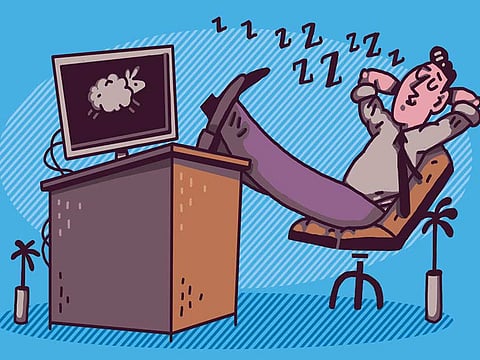How to boost your business? Let workers sleep
Research shows that everything from profits to creativity is improved when employees are well rested. Ounces of sleep offer pounds of business in return

I have long been puzzled by the entrenched mentality, and often enforced practice, of longer work hours and less sleep. Innumerable policies exist within the workplace regarding smoking, substance abuse, ethical behaviour and injury and disease prevention. But insufficient sleep — another physically and mentally harmful, and potentially deadly factor — is commonly tolerated and even, woefully, encouraged.
Many business leaders still believe that time on-task equates to productivity. Even in the industrial era of rote factory work, this was untrue. It is a misguided fallacy, and an expensive one, too. Every key facet required for business success will fail when sleep becomes short within an organisation. Why do we overvalue employees who undervalue sleep, and often glorify the high-powered executive who is on email until 1.30am and in the office by 5.45 the following morning?
Many Fortune 500 companies are interested in KPIs — key performance indicators, or measurables, such as net revenue, goal-accomplishment speed, or commercial success. Numerous employee traits determine these measures, but commonly they include: creativity, intelligence, motivation, effort, efficiency, effectiveness when working in groups, as well as emotional stability, sociability, and honesty. All of these are ruthlessly dismantled by insufficient sleep.
Early studies we have undertaken at the Centre for Human Sleep Science at UC Berkeley have demonstrated that shorter amounts of sleep predict both a lower work rate and slower completion speed of basic tasks. That is, sleepy employees are unproductive employees. Sleep-deprived individuals also generate fewer and less accurate solutions to problems.
We have since designed more work-relevant tasks to explore the effects of insufficient sleep on employee effort, productivity, and creativity. Creativity is, after all, lauded as the engine of business innovation. Give participants the ability to choose between work tasks of varying effort, from easy (eg listening to voicemails) to difficult (eg helping design a complex project that requires thoughtful problem solving and creative planning), and you find that those individuals who obtained less sleep in the preceding days are the same people who consistently select less challenging problems. They opt for the easy way out, generating fewer creative solutions in the process.
Under-slept employees are therefore not going to drive your business forward with productive innovation. Like a group of people riding stationary exercise bikes, everyone looks like they are pedalling, but the scenery never changes — there is no forward progress. The irony that employees miss is that when you are not getting enough sleep, you work less productively and thus need to work longer hours to accomplish a goal. This means you often must work longer and later into the evening, arrive home later, go to bed later, and need to wake up earlier, creating a negative feedback loop. Why try to boil a pot of water on medium heat when you could do so in half the time on high?
The effects of sleep deficiency on CEOs and supervisors are equally powerful. An ineffective leader within any organisation can have manifold trickle-down consequences for the many whom they influence. We often think that a good or bad leader is good or bad day after day — a stable trait. Not true. Differences in individual leadership performance fluctuate dramatically from one day to the next. So what explains the ups and downs of a leader’s ability to effectively lead, day to day? The amount of sleep they are getting is one clear factor.
In a deceptively simple but clever study, researchers tracked the sleep of supervisors across several weeks, and compared that with their leadership performance in the workplace as independently judged by the employees who report to them. On days when the supervisor was under-slept, the employees rated them as being less charismatic, having worse self-control, and being more abusive to others, even though the employees knew nothing about how well their supervisor had slept each night. Weak leadership and bad workplace behaviour were clearly connected to sleep deprivation.
We also made another intriguing discovery: in the days after a supervisor has slept poorly, the employees themselves, even if well rested, become less engaged in their jobs throughout that day as a consequence of their leader’s sleep deficiency. It is a chain-reaction effect, one in which the lack of sleep in one superordinate person within a business structure is transmitted like a virus, infecting even well-rested employees with work disengagement and reduced productivity. It’s all too easy to imagine the multiplicative effect on the success of a business if both the leader and the employees are overworked and under-slept.
Allowing and encouraging employees, supervisors, and executives to arrive at work well rested turns them from looking busy yet being ineffective, to being productive, honest, useful individuals who inspire, support, and help each other. Ounces of sleep offer pounds of business in return.
Less sleep does not, therefore, equate to increased productivity. By any metrics we use to determine business success — whether profit margins, marketplace dominance or prominence, efficiency, employee creativity, or worker satisfaction and wellness — the evidence is clear: sleep is the greatest form of physiologically injected venture capital and competitive advantage any business could dream of.
— Guardian News & Media Ltd
Matthew Walker is professor of neuroscience and psychology at the University of California, Berkeley, where he is director of the Centre for Human Sleep Science, and the author of Why We Sleep.



